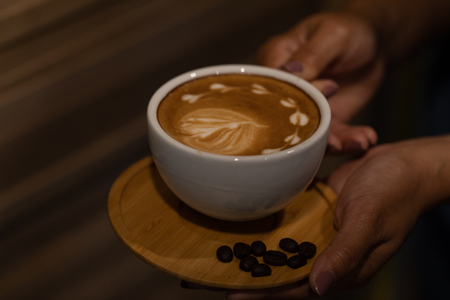1. The Cultural Significance of Coffee in American Daily Life
Coffee isnt just a drink in the United States—its a daily ritual, a social connector, and for many, a source of comfort. Whether its brewing a pot at home before work or stopping by a local café on the way to school, coffee is deeply woven into the fabric of American life. This connection plays an important role when we look at how coffee may impact mental health, especially when comparing regular coffee with decaf.
Morning Rituals and Mental Boosts
For millions of Americans, the day doesnt truly begin until theyve had their first cup of coffee. Its not just about caffeine; it’s about the routine that helps set the tone for the day. Preparing coffee at home or grabbing it on the go is part of what brings structure and comfort to the morning. This ritual can contribute to a sense of control and stability—two things that are vital for mental well-being.
Coffee Shops: Americas Modern Social Hubs
Beyond individual routines, coffee culture in America thrives in social settings. From quick catch-ups with friends to casual business meetings, cafés serve as modern-day gathering spots. These spaces create opportunities for connection—a key element in maintaining good mental health.
Common Coffee Moments in American Culture
| Occasion | Role of Coffee |
|---|---|
| Morning commute | A quick energy boost and daily routine starter |
| Work breaks | A moment to reset and recharge mentally |
| Social meetups | A shared experience that fosters connection |
| Studying or working remotely | A focus aid and comforting background routine |
The Decaf vs. Regular Debate Begins Here
This cultural importance sets the stage for understanding why so many people care about choosing between regular and decaf coffee. It’s not just about taste or caffeine content—it’s about how each choice fits into lifestyle needs and emotional balance. In upcoming sections, well explore how these choices may impact mental health differently and why some people make the switch.
2. Understanding Mental Health and How Diet Plays a Role
Mental health is becoming a bigger part of the everyday conversation in the United States. From workplace stress to anxiety and depression, more Americans are paying attention to how they feel emotionally and mentally. According to the National Institute of Mental Health (NIMH), nearly one in five U.S. adults lives with a mental illness. While therapy, medication, and lifestyle changes are common approaches to improving mental health, diet—especially what we drink every day—also plays a big role.
How Nutrition Connects to Mental Well-Being
What we eat and drink affects our brain just as much as our body. Nutrients like omega-3 fatty acids, B vitamins, and antioxidants help support brain function. On the flip side, too much sugar, processed foods, or stimulants like caffeine can sometimes make symptoms worse for people dealing with anxiety or mood swings.
The Role of Caffeine in Emotional Health
Caffeine is a central nervous system stimulant found in coffee, tea, energy drinks, and even some medications. It can improve alertness and focus in moderate amounts, but it may also lead to jitteriness, sleep problems, or increased anxiety in sensitive individuals. Since coffee is one of the most common sources of caffeine in the U.S., understanding its effects is especially important when talking about mental health.
Caffeine Effects: Regular vs. Decaf
| Type of Coffee | Caffeine Content (per 8 oz) | Potential Mental Health Impact |
|---|---|---|
| Regular Coffee | 80–100 mg | May boost focus; could increase anxiety or disrupt sleep if overconsumed |
| Decaf Coffee | 2–5 mg | Gentler on the nervous system; better option for those sensitive to caffeine or managing anxiety |
Everyday Choices That Make a Difference
For many Americans, starting the day with a cup of coffee is a comforting routine. But depending on your emotional state or sensitivity to caffeine, choosing between regular and decaf might be more than just a taste preference—it could affect how you feel throughout the day. Paying attention to how your body responds can help guide smarter choices that support your mental wellness.

3. Caffeine and Mental Health: The Benefits and the Risks
When it comes to mental health, caffeine—the natural stimulant found in regular coffee—plays a complicated role. For many Americans, starting the day with a cup of coffee is more than just a habit; its a way to boost energy, improve focus, and feel more alert. But how does caffeine actually affect our brain? Lets take a closer look at what recent research says about the impact of regular coffee on concentration, mood, and anxiety levels.
How Caffeine Boosts Brain Function
Caffeine works by blocking adenosine, a neurotransmitter that makes us feel tired. This increases the activity of other chemicals like dopamine and norepinephrine, which help improve focus and mood. That’s why after drinking coffee, you might feel more mentally sharp and ready to tackle your to-do list.
Benefits of Regular Coffee for Mental Performance
Studies show that moderate caffeine intake can have positive effects on mental performance. Here’s a quick overview:
| Mental Effect | How Coffee Helps | Scientific Insight |
|---|---|---|
| Concentration | Improves attention span and reaction time | A 2021 study in “Nutrients” found that caffeine enhances cognitive function in both short- and long-term tasks |
| Mood | Can lift mood and reduce feelings of depression | Harvard researchers found people who drink coffee regularly are less likely to suffer from depression |
| Alertness | Keeps you awake and focused during low-energy periods | A review in “Psychopharmacology” showed caffeine improves vigilance in tired individuals |
The Flip Side: Anxiety and Overstimulation
While caffeine can be helpful in small doses, too much can lead to problems—especially for people prone to anxiety. High doses of caffeine may cause jitteriness, restlessness, or even panic attacks in sensitive individuals. In fact, some mental health professionals recommend patients with anxiety disorders limit or avoid caffeine altogether.
Caffeine Sensitivity Varies by Person
Its important to remember that everyones body reacts differently. Some people can handle three cups of coffee without issue, while others might feel anxious after just one. Factors like genetics, age, sleep habits, and overall health all play a role in how caffeine affects you.
Balancing the Benefits and Risks
If youre someone who enjoys regular coffee but also struggles with stress or anxiety, paying attention to your bodys signals is key. You might find that switching between regular and decaf—or limiting your caffeine intake after a certain time of day—helps you strike the right balance between staying focused and staying calm.
In the end, understanding how caffeine influences your mental state can help you make smarter choices about your daily brew.
4. Decaf Coffee: A Calmer Alternative?
For many coffee lovers, the idea of drinking decaf might seem a little underwhelming. After all, whats coffee without the caffeine kick, right? But when it comes to mental health—especially for folks dealing with anxiety or trouble sleeping—decaf coffee might actually offer some real advantages.
Why Consider Decaf?
Caffeine is a natural stimulant that can increase alertness and boost mood in small doses. However, for individuals who are sensitive to caffeine, it can also trigger nervousness, jitters, or even panic attacks. People with anxiety disorders often find that reducing their caffeine intake helps them feel more balanced throughout the day.
Potential Benefits of Decaf for Mental Health
| Benefit | Description |
|---|---|
| Reduced Anxiety Symptoms | No caffeine means less stimulation to the nervous system, which may help reduce feelings of restlessness and worry. |
| Improved Sleep Quality | Decaf allows people to enjoy the ritual of an evening cup without interfering with their ability to fall asleep. |
| Maintains Social Rituals | People can still enjoy coffee breaks and social moments without the negative effects of caffeine. |
Busting Common Myths About Decaf
There are a few misconceptions floating around about decaf coffee. Let’s set the record straight:
Myth #1: Decaf Has Zero Caffeine
Not quite! Most decaf coffees still contain a small amount of caffeine—usually around 2 to 5 milligrams per cup compared to 80-100 mg in regular coffee. It’s low enough not to cause most side effects but still something to be aware of if you’re extremely sensitive.
Myth #2: Decaf Tastes Bad
This used to be true years ago, but today’s decaf options have come a long way. With improved processing methods and high-quality beans, many specialty coffee roasters now offer decaf blends that taste just as rich and flavorful as their regular counterparts.
Myth #3: Decaf Is Unnatural or Unsafe
The decaffeination process has evolved over time. Methods like the Swiss Water Process use only water (no chemicals) to remove caffeine, making them safe and environmentally friendly choices for health-conscious consumers.
Who Might Benefit Most from Decaf?
If you fall into one of these categories, switching to decaf—or mixing it into your routine—might be worth considering:
- People with generalized anxiety disorder or panic disorder
- Individuals who experience insomnia or disrupted sleep patterns
- Pregnant women looking to limit caffeine intake
- Anyone managing high blood pressure or heart palpitations
Ultimately, choosing between regular and decaf isn’t about picking sides—it’s about finding what works best for your body and mind. For those seeking a calmer cup without compromising on flavor or comfort, decaf could be a surprisingly smart choice.
5. Making the Right Choice: Decaf or Regular for Mental Wellness?
Choosing between decaf and regular coffee can feel like a small decision, but when it comes to mental wellness, that choice might matter more than you think. Everyone reacts differently to caffeine, and your daily lifestyle and emotional well-being play a big role in figuring out what’s best for you. Here’s how to make an informed choice that supports your mental health goals.
Understanding How Coffee Affects You
Caffeine is a stimulant, which means it can boost alertness and energy levels—but it can also lead to increased anxiety, restlessness, or trouble sleeping in some people. On the other hand, decaf offers the familiar comfort of coffee without most of the stimulating effects.
If you’re dealing with anxiety, sleep issues, or stress-related symptoms, reducing caffeine might be worth considering. But if you thrive on a morning boost and don’t notice negative side effects, regular coffee could still fit well into your routine.
Quick Comparison: Regular vs. Decaf
| Regular Coffee | Decaf Coffee | |
|---|---|---|
| Caffeine Content (per 8 oz) | 80–100 mg | 2–5 mg |
| Mental Boost | Can enhance focus & mood short-term | Milder effect; less stimulation |
| Anxiety Impact | May worsen symptoms in sensitive individuals | Generally gentler on the nervous system |
| Sleep Disruption | More likely if consumed late in the day | Less likely to interfere with sleep |
| Taste & Ritual | Bolder flavor; traditional pick-me-up | Smoother taste; same comforting habit without jitters |
Lifestyle Tips for Choosing What’s Right for You
If You’re Sensitive to Caffeine:
You may want to switch to decaf or limit yourself to one cup of regular coffee in the morning. Watch how your body reacts—jitters, racing thoughts, or disrupted sleep are all signs that caffeine might be too much.
If You Rely on Coffee for Energy:
A moderate amount of regular coffee can help you stay focused and productive. Just keep an eye on how much you’re drinking throughout the day—too much can backfire by increasing anxiety or making it hard to wind down at night.
If You Drink Coffee for Comfort or Routine:
The warm mug in your hands, the aroma in the air—these are all part of what makes coffee special. If it’s mostly about the ritual for you, decaf could give you those same good vibes without overloading your system.
Your Mental Health Comes First
No matter what kind of coffee you choose, remember that your mental wellness should always come first. Pay attention to how you feel after drinking coffee—mentally and physically—and adjust accordingly. It’s okay if your needs change over time. What matters most is finding a balance that works for your mind and body.


